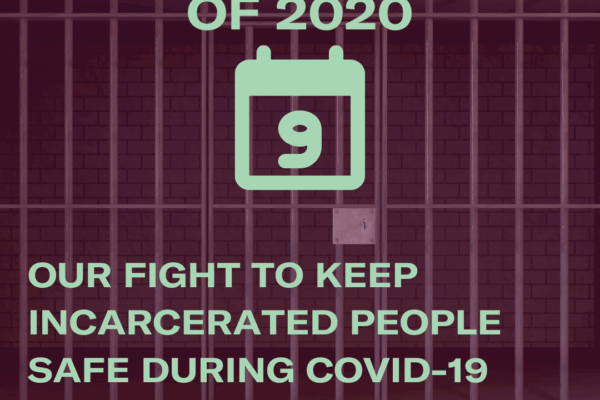The past year has brought multiple crises – from the continued murder of Black people by law enforcement, to the direct and collateral harms of COVID-19, to systematic efforts to restrict the fundamental right to vote, and more.
Thanks to ACLU supporters like you, we stood ready to face these crises – and we are ready for whatever comes next.
For the rest of this month, we invite you to tune in as we share some of our accomplishments from the past year. While we achieved many successes in 2020, much work remains before we can consider South Carolina a state where We the People means everyone. Thank you for being part of this work.
Read more about this work:
Protecting Incarcerated People from COVID-19
COVID-19 has laid bare the longstanding inadequacies of South Carolina’s prisons and jails. Under this system, approximately 30,000 people are caged each day and night. Under this system, Black people make up 60 percent of prison population and 62 percent of the jail population despite being only 27 percent of state population.
COVID-19 arrived in a prison system already suffering from horrific conditions of confinement. For years, the South Carolina Department of Corrections (SCDC) has been plagued by a chronic staffing shortage which created conditions that led to a deadly riot at Lee Correctional Institution in 2018. A 2019 report by the S.C. General Assembly Legislative Audit Council concluded that SCDC is unequipped to maintain safe operations and deliver necessary medical care and programs to incarcerated people on an average day, much less during a deadly pandemic.
COVID-19 arrived in a jail system where, on any given day in South Carolina, the majority of incarcerated people are there simply because they are too poor to afford pay bail. South Carolina’s two-tiered justice system already disproportionately punishes people who are poor, and during this pandemic, economic hardship could amount to a death sentence.
When COVID-19 first broke out in South Carolina, we recognized the unique dangers the virus posed for incarcerated individuals. As a medically vulnerable group, incarcerated people are already at an increased risk of suffering harmful effects from the virus. This risk is only made worse by the close quarters in which incarcerated people are housed that make social distancing impossible. The existing staff shortages within SCDC further exploit incarcerated people’s vulnerability to the virus due to an increased, but unmet, demand for transportation to outside medical appointments. Prisons and jails can also quickly become vectors for the spread of COVID-19 into our communities, as unwitting infected staff enter and leave corrections facilities.
With all of these factors in mind, we sent several letters to every jail administrator and sheriff in the state, as well as to SCDC and Governor Henry McMaster, advocating for the implementation of a COVID-19 policy based on CDC guidelines and recommendations.
At the same time, we established an email and phone “hotline” to track individual and system-wide areas of concern during the pandemic. We communicated with hundreds of individuals, including incarcerated individuals and their loved ones. Through the hotline, we were able to see that the public proclamations being made by the SCDC director and jail officials did not match the dire reality experienced by incarcerated people across the state.
Given the serious nature and rapid spread of the pandemic, we determined litigation was going to be necessary. We partnered with a litigation team from the international law firm Arnold + Porter, identified several plaintiffs based on our hotline communications, and filed a class-action lawsuit (Voltz-Loomis et. al v. McMaster, et. al,) in April on behalf of all incarcerated people inside SCDC.
As a result of our advocacy, SCDC implemented:
A COVID-19 response policy implementing procedures based on CDC guidelines, including sanitation and medical guidelines;
- Widespread testing of incarcerated people;
- A timely posting of the number of incarcerated individuals and staff testing positive for COVID-19 at each correctional institution, as well as the numbers of deaths relating to the same, on their website;
- A special rapid grievance process to dramatically reduce the time for wardens to respond to grievances made by incarcerated people regarding the COVID-19 policy; and
- A procedure for flagging parole-eligible individuals with underlying medical conditions increasing their vulnerability to COVID-19 for review and consideration by the Parole Board.
This resolution is an important step toward protecting incarcerated people during COVID-19, but there is more work to be done moving forward to ensure the safety of those in our state’s care.
At the jail level, we, along with our partners at Root & Rebound, South Carolina Appleseed Legal Justice Center, and Wyche, P.A. filed litigation against the Spartanburg County Sheriff and Jail Administrator for their failure to protect incarcerated people from risks associated with a COVID-19 outbreak in custodial settings.
The suit seeks immediate protections for people incarcerated in the Spartanburg County Detention Center, including policy and procedural changes to allow all incarcerated people and staff free, unlimited access to soap, disinfecting cleaners, and personal protective equipment, and to require and enforce social distancing of six feet. Additionally, the suit seeks immediate relief for incarcerated people who are at particular risk of serious harm or death from COVID-19, including those who are older than 55, pregnant, or have defined underlying medical conditions.
This case continues to move forward.
Since the early days of COVID-19, public health experts have been sounding the alarm on the dire risks associated with being incarcerated during the outbreak. We are committed to holding South Carolina corrections officials and jail administrators accountable for protecting those in their care.

